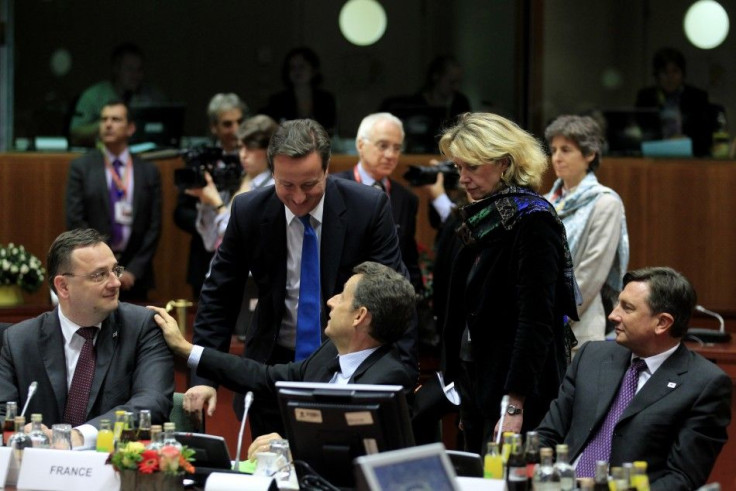EU-27 Joint Statement on Eurozone Crisis Summit Meeting (FULL-TEXT)

The European Union (EU)-27 has released the following joint statement on the Eurozone debt crisis summit taking place in Brussels, Belgium:
At today's meeting, in line with paragraph 7 of the European Council conclusions of 23 October concerning relations between the EU and the Euro area, the members of the European Council were informed by President Van Rompuy about the state of preparations of the Euro Summit that will take place later in the day.
They discussed the situation and underlined their common resolve to do their utmost to overcome the crisis and to help face in a spirit of solidarity the challenges confronting the European Union and the Euro area.
They welcomed the consensus on measures to restore confidence in the banking sector reached by the Council (ECOFIN) on 22 October. On this basis, they agreed the text annexed to this statement subject to agreement on the measures indicated in this text forming part of a broader package, including the decisions to be taken by today's meeting of the Euro Summit. The Council (ECOFIN) will finalize the work and adopt the necessary follow up measures.
Consensus on banking package
Measures for restoring confidence in the banking sector (banking package) are urgently needed and are necessary in the context of strengthening prudential control of the EU banking sector. These measures should address:
The need to ensure the medium-term funding of banks, in order to avoid a credit crunch and to safeguard the flow of credit to the real economy, and to coordinate measures to achieve this. The need to enhance the quality and quantity of capital of banks to withstand shocks and to demonstrate this enhancement in a reliable and harmonized way.
Term funding
Guarantees on bank liabilities would be required to provide more direct support for banks in accessing term funding (short-term funding being available at the ECB and relevant national central banks), where appropriate. This is also an essential part of the strategy to limit deleveraging actions.
A simple repetition of the 2008 experience with full national discretion in the setting-up of liquidity schemes may not provide a satisfactory solution under current market conditions. Therefore a truly coordinated approach at EU-level is needed regarding entry criteria, pricing and conditions. The Commission should urgently explore together with the EBA, EIB, ECB the options for achieving this objective and report to the EFC.
Capitalization of banks
Capital target: There is broad agreement on requiring a significantly higher capital ratio of 9pc of the highest quality capital and after accounting for market valuation of sovereign debt exposures, both as of 30 September 2011, to create a temporary buffer, which is justified by the exceptional circumstances. This quantitative capital target will have to be attained by 30 June 2012, based on plans agreed with national supervisors and coordinated by EBA. This prudent valuation would not affect the relevant financial reporting rules. National supervisory authorities, under the auspices of the EBA, must ensure that banks’ plans to strengthen capital do not lead to excessive deleveraging, including maintaining the credit flow to the real economy and taking into account current exposure levels of the group including their subsidiaries in all Member States, cognizant of the need to avoid undue pressure on credit extension in host countries or on sovereign debt markets.
Financing of capital increase: Banks should first use private sources of capital, including through restructuring and conversion of debt to equity instruments. Banks should be subject to constraints regarding the distribution of dividends and bonus payments until the target has been attained. If necessary, national governments should provide support , and if this support is not available, recapitalization should be funded via a loan from the EFSF in the case of Eurozone countries.
State aid
Any form of public support, whether at a national or EU-level, will be subject to the conditionality of the current special state aid crisis framework, which the Commission has indicated will be applied with the necessary proportionality in view of the systemic character of the crisis.
© Copyright IBTimes 2024. All rights reserved.





















